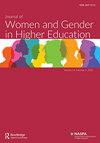使用交叉性来重新构想第九条裁决政策
Q2 Social Sciences
Journal of Women and Gender in Higher Education
Pub Date : 2023-01-02
DOI:10.1080/26379112.2023.2169448
引用次数: 0
摘要
运用批判性话语分析,本文揭示了权力是如何固有的,并通过第九章基于校园的裁决过程维持。我们通过交叉分析框架询问身份和权力在第九条裁决过程中的作用。我们挑战对公平和中立的依赖,这种依赖导致各机构采取一刀切的方式来实施这一政策。我们还展示了与刑事司法系统的相似之处如何不成比例地压迫具有边缘化身份的幸存者。我们提供政策建议和第九章裁决的替代方案,例如基于社区的恢复性和变革性司法程序。我们敦促校园教育工作者推动政策,关注幸存者的社会政治和历史背景,从惩罚性的过程转向以幸存者为中心和以社区为中心的过程。本文章由计算机程序翻译,如有差异,请以英文原文为准。
Using Intersectionality to Reimagine Title IX Adjudication Policy
Using critical discourse analysis, this article reveals how power is inherent in and maintained through Title IX campus-based adjudication processes. We interrogate the role of identity and power in Title IX adjudication processes through an intersectional analytic framework. We challenge the reliance on fairness and neutrality, which leads institutions to a one-size-fits-all approach to implementing this policy. We also demonstrate how parallels to the criminal justice system disproportionately oppress survivors with marginalized identities. We offer policy recommendations and alternatives to Title IX adjudication, such as restorative and transformative justice community-based processes. We urge campus educators to push for policy that attends to the sociopolitical and historical context of survivors and moves from punitive processes to survivor-centered and community-focused ones.
求助全文
通过发布文献求助,成功后即可免费获取论文全文。
去求助
来源期刊

Journal of Women and Gender in Higher Education
Social Sciences-Gender Studies
CiteScore
1.40
自引率
0.00%
发文量
20
 求助内容:
求助内容: 应助结果提醒方式:
应助结果提醒方式:


